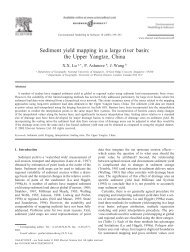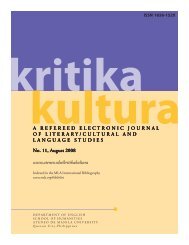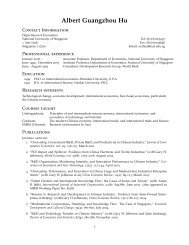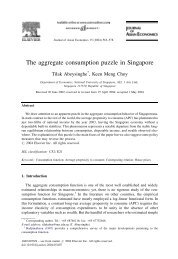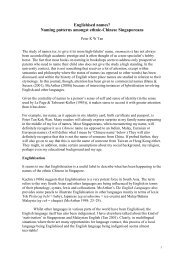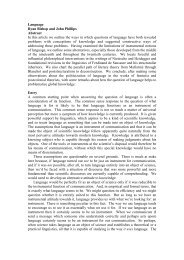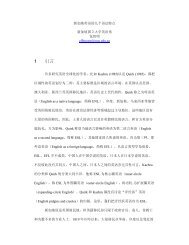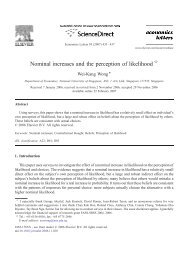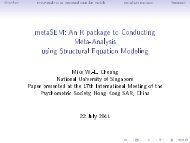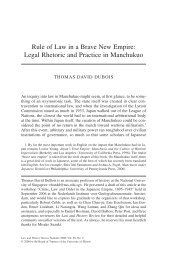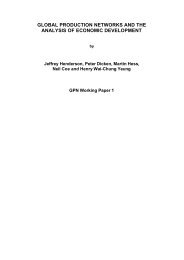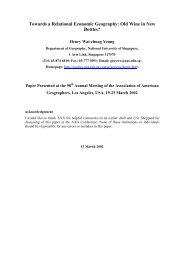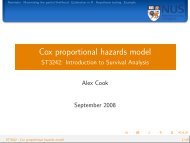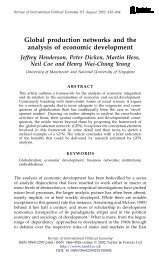Researching Hybridity in Social and Economic ... - NUS Home
Researching Hybridity in Social and Economic ... - NUS Home
Researching Hybridity in Social and Economic ... - NUS Home
You also want an ePaper? Increase the reach of your titles
YUMPU automatically turns print PDFs into web optimized ePapers that Google loves.
This multi-locational <strong>and</strong> multi-discipl<strong>in</strong>ary research <strong>in</strong>to Ch<strong>in</strong>ese capitalism takes me<br />
to the most important aspect of the <strong>in</strong>tegrated method approach – abstraction <strong>and</strong><br />
deconstruction (see Figure 1). Instead of overtly concerned with describ<strong>in</strong>g everyth<strong>in</strong>g about<br />
actor networks <strong>in</strong> Ch<strong>in</strong>ese capitalism – a methodological procedure often found <strong>in</strong><br />
ethnography (e.g. Yang, 1994; Yao, 2002) <strong>and</strong> some quarters of actor network theory (e.g.<br />
Murdoch, 1997a), I was <strong>in</strong>terested <strong>in</strong> unfold<strong>in</strong>g the multiple logic(s) of these actor networks,<br />
their shift<strong>in</strong>g identities <strong>and</strong> discursive constructions, <strong>and</strong> the diverse mechanisms of their<br />
enrolment. This approach to Ch<strong>in</strong>ese capitalism requires me to focus on key social actors <strong>and</strong><br />
their dynamics <strong>in</strong> different spatial <strong>and</strong> temporal sett<strong>in</strong>gs. I believed that these processes do not<br />
emerge directly from empirical observations. In other words, data do not speak for<br />
themselves. I needed abstraction to distill these multiple logic(s) <strong>and</strong> causal mechanisms of<br />
Ch<strong>in</strong>ese capitalism from an array of messy empirical data, <strong>and</strong> to facilitate theory<br />
development (cf. Whitley, 1992; 1999; Orrù et al., 1997). Equally important, I wanted to go<br />
beyond a materialist theory of Ch<strong>in</strong>ese capitalism that focuses narrowly on its economic<br />
structures <strong>and</strong> is oblivious to its discursive constructions. Deconstruction is therefore a useful<br />
method to identify different discourses of the rise of Ch<strong>in</strong>ese capitalism <strong>and</strong> Ch<strong>in</strong>ese bus<strong>in</strong>ess<br />
networks as a vocabulary <strong>in</strong> our underst<strong>and</strong><strong>in</strong>g of economic organization <strong>in</strong> East <strong>and</strong><br />
Southeast Asia. Follow<strong>in</strong>g Derrida, Dixon <strong>and</strong> Jones (1998: 255; emphasis omitted) def<strong>in</strong>e<br />
deconstruction as a method that aims to “del<strong>in</strong>eate the social power that fixes mean<strong>in</strong>gs<br />
constructive of identities, spaces, <strong>and</strong> discipl<strong>in</strong>es”. By decenter<strong>in</strong>g hegemonic discourses of<br />
Ch<strong>in</strong>ese capitalism as essential products of Confucian culture, I sought to theorize the time-<br />
space dynamism of everyday life by Ch<strong>in</strong>ese <strong>and</strong> non-Ch<strong>in</strong>ese actors bound up with<strong>in</strong> specific<br />
hybrid networks of social <strong>and</strong> economic relationships.<br />
24



